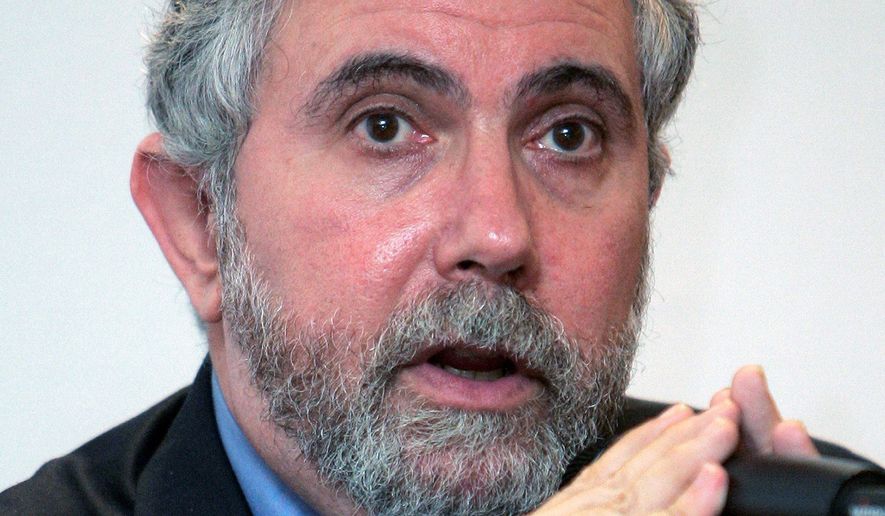OPINION:
Novelist Charles Dudley Warner wrote that “politics makes strange bedfellows.” That’s true, but it can also apply to other fields.
Here’s an example. A chance meeting between Paul Krugman (a liberal U.S. economist) and Etsuro Honda (economist and adviser to Japanese Prime Minister Shinzo Abe, a conservative) may have just saved the Land of the Rising Sun from economic ruin.
Mr. Honda has been a vocal opponent of the prime minister’s proposed sales tax increase next year. According to Bloomberg Businessweek’s Toru Fujioka and Simon Kennedy, “Evidence was mounting that the world’s third-largest economy was struggling to shake off the blow from raising the rate in April, which had triggered Japan’s deepest quarterly contraction since the global credit crisis.”
Alas, Mr. Honda’s efforts in delaying this tax hike had failed, and the December deadline was fast approaching. When he heard that Mr. Krugman, who supported a delay in some of his New York Times columns, was coming to Tokyo, he quickly arranged a meeting between the economist and the prime minister during a limousine ride.
It was an interesting tactic. As Mr. Fujikora and Mr. Kennedy wrote, “The concept of outside opinion influencing Japanese decision-making is known as gaiatsu, or foreign pressure, in Japanese.” There is “historical precedent since at least the arrival of U.S. Commodore Matthew Perry’s squadron in 1853 in Tokyo Bay, which led to an opening in the nation’s trade policies.” In fact, “[g]aiatsu also has been used as cover by Japanese officials when they’ve pushed through controversial measures.”
No one is exactly sharing what was discussed in the limo or in the Nov. 6 meeting.
Mr. Krugman said Mr. Abe “was very straightforward. He had questions and I hope I answered them clearly. I told him the kinds of things I’ve been writing — I hope I made a good case.” Mr. Honda was more definitive, saying this tete-a-tete “nailed Abe’s decision — Krugman was Krugman, he was so powerful. I call it a historic meeting.”
The result? Last week, Mr. Abe put off the sales tax increase for another 18 months (and, one hopes, even longer). Mr. Honda is breathing a heavy sigh of relief. Mr. Krugman made this simple statement: “I’m happy to see what they’re doing.”
In fairness, Mr. Krugman is a Nobel Prize-winning economist who has been consulted on financial matters by various individuals from all walks of life. His beliefs are an odd mix of Keynesian economics (i.e., belief in “discretionary” government intervention, dislike of business cycles) with, of all things, a pro-free-trade agenda.
Even so, it’s strange that Mr. Abe, a fiscally conservative politician, took the advice to delay a tax increase from a politically liberal economist. It makes you wonder about Japanese politics and the state of political and economic conservatism in that country.
Since the end of World War II, Japan has served as an admirable model for running a free market economy within a democracy (banking crises aside, of course). Mr. Abe, who has been prime minister since September 2012, has been called everything from a political conservative to a right-wing nationalist.
He also has governed under a definitive economic model, Abenomics. As defined by the Financial Times, Mr. Abe’s “aim was to revive the sluggish economy with ’three arrows’: a massive fiscal stimulus, more aggressive monetary easing from the Bank of Japan, and structural reforms to boost Japan’s competitiveness.”
The first couple of arrows reformed fiscal and monetary policy and improved Japan’s economic fortunes. The third arrow was designed for his Liberal Democratic government to increase women’s roles in the public and private sectors, establish more child care facilities in urban areas and high-wage jobs in rural communities, reform pensions, and spur trade liberalization.
Mr. Abe wrote in a Sept. 18 op-ed for The Wall Street Journal: “We have already seen improvements in the employment rate and wages. Make no mistake, Japan will emerge from economic contraction and advance into new fields and engage in fresh challenges.” Yet Mr. Abe’s proposed sales tax increase could have done the reverse: ruined the country’s economy and sent it into a long-term downward spiral.
That’s a thing of the past, however. Mr. Abe called for snap elections on Dec. 14. In spite of his recent economic shenanigans, he is leading in the polls. If he is re-elected, it will be in large part because of a liberal economist’s advice to his conservative government to avoid raising taxes, which is rather anti-conservative in nature.
’Tis a strange world we live in.
⦁ Michael Taube is a contributor to The Washington Times.




Please read our comment policy before commenting.